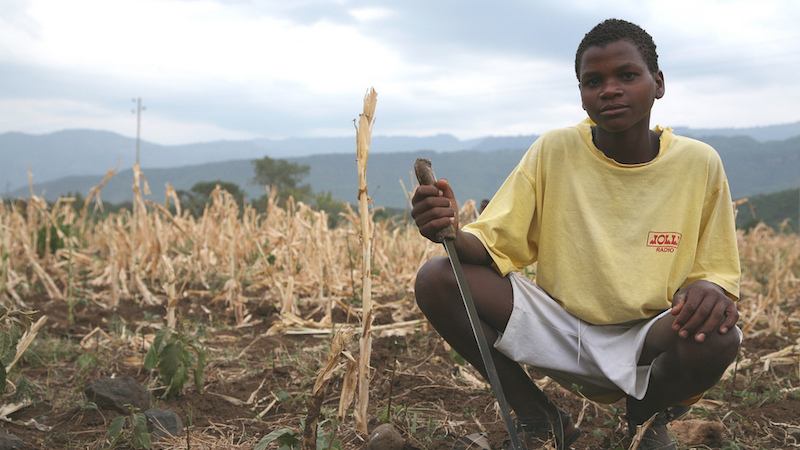Other wealthy nations will have to do more to fill the hole in global climate finance left by the US, according to the world’s most vulnerable countries.
At the beginning of June, US president Donald Trump announced he would leave the Paris climate accord and cease funding to overseas climate programmes.
The Ethiopian government, which chairs the Climate Vulnerable Forum (CVF), a group of 48 nations on the front line of climate change, said the US had left the world’s poorest and most fragile communities exposed.
“As the economy that has made the greatest contribution to planetary warming, this signifies an endangerment of the more than one billion people our Forum represents in Africa, Asia, the Caribbean, Latin America and the Pacific,” said the statement.
Climate Weekly: Sign up for your essential climate news update
At the Copenhagen climate conference in 2009, rich nations pledged to shift $100bn worth of investments, grants and loans to climate action in the poor world every year, starting in 2020.
The statement by the CVF chair pointed to the “collective nature” of that commitment. In other words, if the US won’t front the cash, other wealthy nations will need to do more to meet the mark.
“If one country walks away from this promise now that doesn’t change the promise as such,” said Jan Kowalzig, a senior policy advisor to Oxfam’s German branch. “The availability and adequacy of such support has a direct influence on the faith in the process.”
Climate finance has been one of the most fraught aspects of the UN climate talks since their earliest days. Wealthy nations are habitually reluctant to commit to more finance.
But in a statement released in the hours after Trump’s infamous speech on the Paris deal, the leaders of Germany, France and Italy released a statement in support of the agreement, “including its climate finance goals”.
Report: Rich countries oppose bid to drought-proof Ethiopian communities
Gebru Jember Endalew, chair of the Least Developed Countries group, a bloc that negotiates on behalf of the poorest nations at UN talks, told Climate Home the group was “deeply disappointed in president Trump’s decision to renege on commitments to provide climate finance to the world’s poorest and most vulnerable countries”.
But he added that even before the news from the US, there had been no clear plan for how the rich world would meet the $100bn pledge. The OECD projects publicly-funded climate finance will grow from $43.5bn in 2014 to $66.8bn by 2020. That will be topped up to $100bn by the extra investment that money “mobilises” by making projects more attractive to private capital.
But many poor countries disagree that public and private money can be treated as equal. According to Oxfam, private capital shies away from necessary but unprofitable projects that protect populations from disaster.
“The situation was concerning yesterday, and with Donald Trump’s irresponsible move it has become even more so today,” said Kowalzig.
While the process for withdrawing the US from the Paris accord may take years, Trump immediately ended US contributions to the UN Green Climate Fund (GCF) – the flagship initiative for dispersing finance to climate-related projects. The US has contributed $1bn to the fund, but has $2bn outstanding from a pledge it made in 2015.
Kowalzig said this would not have an immediate impact on the functioning of the fund. “As for now, the GCF has money in its accounts and can continue to approve projects… but of course it is already clear that the missing $2bn are going to be missed, not today but tomorrow, in many parts of the world where poor and vulnerable people are living on the front line of worsening climate change damages.”
“Conservative estimates put the global need at closer to $100 billion a year by 2020, so we are obviously very far from that goal. That means public and private sources will have to be mobilised and fortunately we have seen numerous companies reaffirm their support of the Paris Agreement in recent days. But the finance gap is a significant obstacle to progress and certainly opens the door for new climate leaders to emerge and provide the level of resources needed to tackle the challenge,” he said.
In recent weeks, other countries have indeed laid claim to climate leadership roles. China has been particularly active, conducting diplomacy with the leaders of France, the European Union, India and the governor of California.
Report: China’s Xi promises green ‘belt and road’ investment strategy
China recently announced a vast $900bn overseas infrastructure investment strategy, which the government said would support “green” development. The country is also one of the largest exporters of coal power technology.
Paula Caballero, global director of the World Resources Institute climate programme, said the growth of China’s economy and global ambitions could lead to more money flowing to the developing world. But that it was unlikely the country would count that support towards the $100bn pledge, which is the responsibility taken on by wealthy countries.
“Outside of the negotiations and in the real economy South-South cooperation and flows will likely increase, but explicit and formal pledges by emerging economies in the UNFCCC [UN climate talks] space would be very unlikely. At least not anytime soon,” said Caballero.
